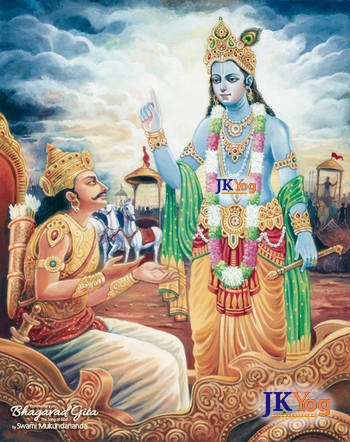

शुभाशुभफलैरेवं मोक्ष्यसे कर्मबन्धनै: |
संन्यासयोगयुक्तात्मा विमुक्तो मामुपैष्यसि || 28||
śhubhāśhubha-phalair evaṁ mokṣhyase karma-bandhanaiḥ
sannyāsa-yoga-yuktātmā vimukto mām upaiṣhyasi
shubhashubha-phalair evam mokshyase karma-bandhanaih
sannyasa-yoga-yuktatma vimukto mam upaishyasi
BG 9.28: By dedicating all your works to Me, you will be freed from the bondage of good and bad results. With your mind attached to Me through renunciation, you will be liberated and will reach Me.

Start your day with a nugget of timeless inspiring wisdom from the Holy Bhagavad Gita delivered straight to your email!
Every action has defects, just as fire is covered by smoke. When we walk on the earth, we unknowingly kill millions of tiny living entities. In our occupational duties, no matter how careful we are in the fulfillment of our duties, we still end up harming the environment and hurting others. Even if we eat a cup of yogurt, we still incur the sin of destroying the living entities that reside in it. Some religious sects try to reduce this involuntary killing by tying a cloth over their mouth. Even this does not fully eliminate the destruction of living entities in our breath.
When we perform our actions with the intention of fulfilling our self-interest, we are culpable for the sins we commit, knowingly or unknowingly. In accordance with the law of karma, we have to reap their karmic reactions. Good works can also be binding because they oblige the soul to go to the celestial abodes to enjoy their results. Thus, both bad and good karmas result in the continuity of the cycle of birth and death. However, in this verse, Shree Krishna gives a simple solution for destroying all karmic reactions of work. He uses the word sanyās yog, meaning renunciation of selfishness. He says that when we dedicate our actions for the pleasure of the Lord, we are freed from the fetters of both good and bad results.
Those who establish themselves in such consciousness are called yog yuktātmā (united in consciousness with God). Such yogis become jīvan mukt (liberated in consciousness) even in this body. And, upon leaving their mortal frame, they receive a divine body and eternal service in the divine Abode of God.